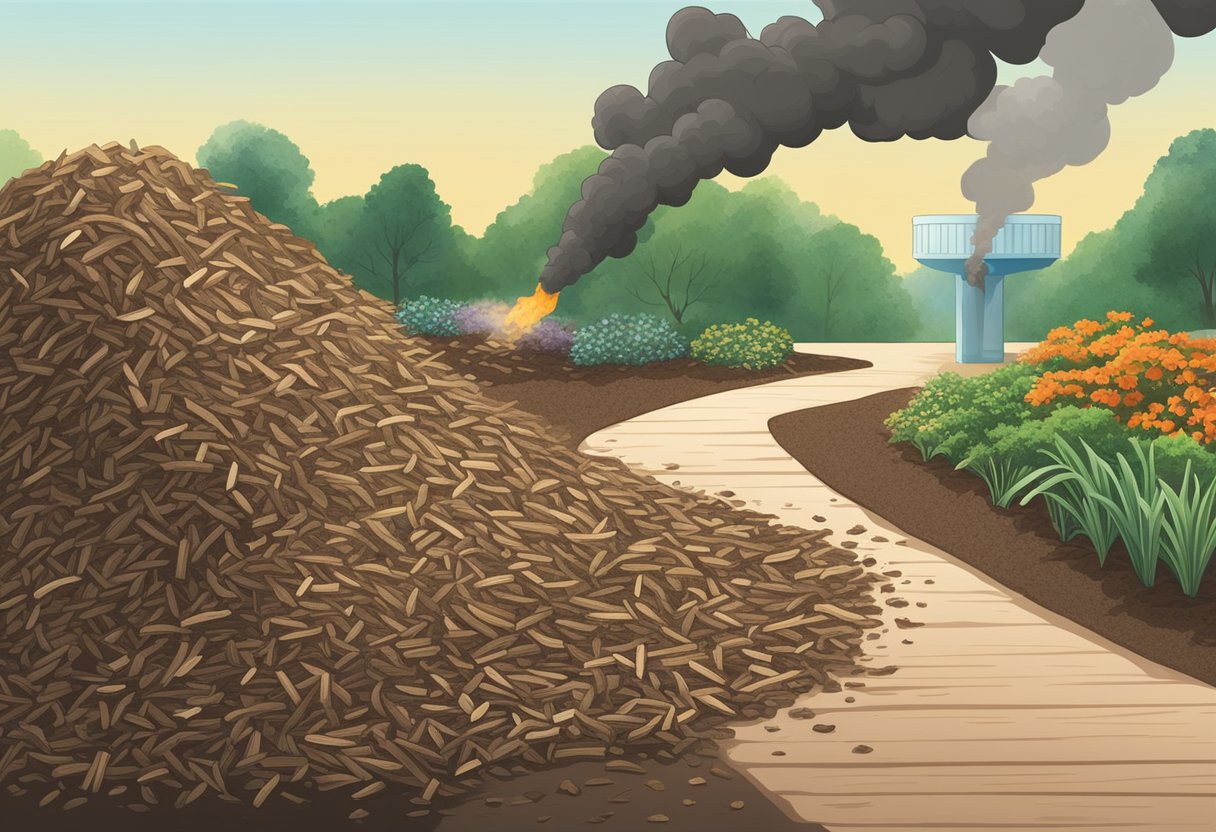Mulch is an invaluable component in maintaining a healthy and vibrant garden. Its benefits range from conserving soil moisture to suppressing weeds and aiding the ecosystem of microorganisms within the soil. But, as many gardeners will attest, mulch can sometimes emit a foul smell, transforming it from a garden ally to a source of unpleasant odors. The smell is usually a result of improper decomposition within the mulch, indicating that something within the mulching process has gone awry.

The presence of a bad smell usually means the mulch is experiencing anaerobic decomposition, a process where, in the absence of adequate oxygen, microbes produce unwanted byproducts like methane, hydrogen sulfide, and acetic acid. Recognizing the origin of mulch odors is the first step to revitalizing your garden’s aromatic appeal. Removing the stench often involves introducing more oxygen to the mix, redistributing the materials, or even replacing portions of the mulch with fresh layers. I have implemented these strategies in my garden with great success, resulting in healthier plants and a more enjoyable outdoor space.
In my experience, the surefire way to eliminate the offensive smell from mulch is to aerate it, ensure proper moisture levels, and add fresh mulch to the affected area to dilute the concentration of odor-producing substances.
JUMP TO TOPIC
Identifying and Understanding Mulch Odors
As a seasoned gardener, I’ve encountered various mulch odors over the years. My experience has taught me that understanding these smells is crucial to maintaining a healthy garden.
Common Causes of Unpleasant Mulch Smells
In my garden, I’ve noticed that mulch odors often arise from decomposing organic matter. This natural process is typically the main culprit behind the smell. Common contributors include:
- Bacteria: Thriving in moist conditions, bacteria break down organic materials, sometimes resulting in unpleasant odors.
- Anaerobic Conditions: When mulch is too wet and lacks proper aeration, anaerobic bacteria take over, producing a sour smell.
- Chemical Imbalance: Imbalanced pH levels in mulch can also lead to foul odors due to increased bacterial activity.
Decomposition Process and Its Impact on Odor
Decomposition is essential for mulch to enrich the soil, but certain conditions can turn this process foul:
- Aeration: Without adequate oxygen, anaerobic decomposition occurs, releasing foul-smelling byproducts.
- Moisture Levels: Excessive moisture can expedite anaerobic activity, increasing the potential for unpleasant odors.
Chemical Reactions Leading to Foul Smells in Mulch
My mulch has sometimes emitted sour odors; understanding the chemical reactions involved is key:
- Hydrogen Sulfide: This gas, reminiscent of rotten eggs, can emanate from mulch due to sulfur-reducing bacteria.
- Ammonia & Acetic Acid: These substances are byproducts of anaerobic breakdown and can contribute significantly to the characteristic sour mulch smell.
In identifying these smells, I’ve been able to take corrective action to ensure my mulch benefits my garden without the unpleasant side effects.
The Effect of Mulch Types on Soil and Plant Health
When selecting mulch, it’s crucial to understand the impact each type has on soil structure and plant vitality. This encompasses both the pros and cons of organic versus inorganic options, as well as their ability to optimize essential soil properties.
Organic vs. Inorganic Mulch: Pros and Cons
💥 Key Point: Organic material benefits soil and plants.
Optimizing Soil Nutrients and Moisture with Proper Mulching
Organic mulches do more than just add to the beauty of a garden; they play a crucial role in maintaining soil health. As these materials break down, they supply a steady stream of nutrients to the soil and the plants. This process can enhance the microbial activity within the soil, thus supporting plant growth. When applied properly, these mulches help to conserve soil moisture, reduce temperature fluctuations, and prevent erosion.
Maintaining the appropriate level of moisture is vital for plant health, and both organic and inorganic mulches are useful in achieving this. However, it’s important to monitor organic mulch to prevent excessive moisture, which can lead to unpleasant odors or plant diseases.
Best Practices for Maintaining Healthy Mulch
Healthy mulch is essential for nutrient addition, weed control, and soil moisture conservation. Proper maintenance and aeration techniques are key to preventing unpleasant odors and keeping mulch beneficial for your garden.
Preventing and Mitigating Sour Mulch Scenarios
💥 Recognizing Sour Mulch
If your mulch has a sour or rotten egg smell, it’s likely undergoing anaerobic decomposition, which can harm plants. To prevent this, I ensure that the mulch I use has been properly composted to avoid the build-up of harmful toxins such as hydrogen sulfide or ammonia.
If you encounter sour mulch, remove the affected layer or spread it out to dry. Neutralizing agents like baking soda may also be applied to mitigate the foul smell. Regularly inspecting and turning the mulch can help prevent anaerobic conditions.
Mulch Maintenance Techniques to Promote Aeration
Proper aeration of mulch is crucial for preventing sour mulch and promoting healthy decomposition. Here’s what I do to make sure my mulch is well-aerated:
-
Regular Turning: I turn my mulch periodically to introduce oxygen, which is necessary for aerobic decomposition and to dissipate any accumulated gases.
-
Adequate Spacing: When applying mulch, I ensure it’s not too thick. A layer of 2-3 inches is ideal to retain moisture while still allowing air to penetrate.
-
Material Choice: I opt for coarse mulch materials, as they tend to promote better airflow compared to finely ground options.
-
Additives: I sometimes mix in natural materials, such as coffee grounds, which can provide fertilization and enhance soil structure, thus indirectly promoting aeration.
By maintaining the proper conditions and regular care, mulch transforms into a supportive element of the garden ecosystem, contributing to the health of the plants without the drawback of offensive odors.











